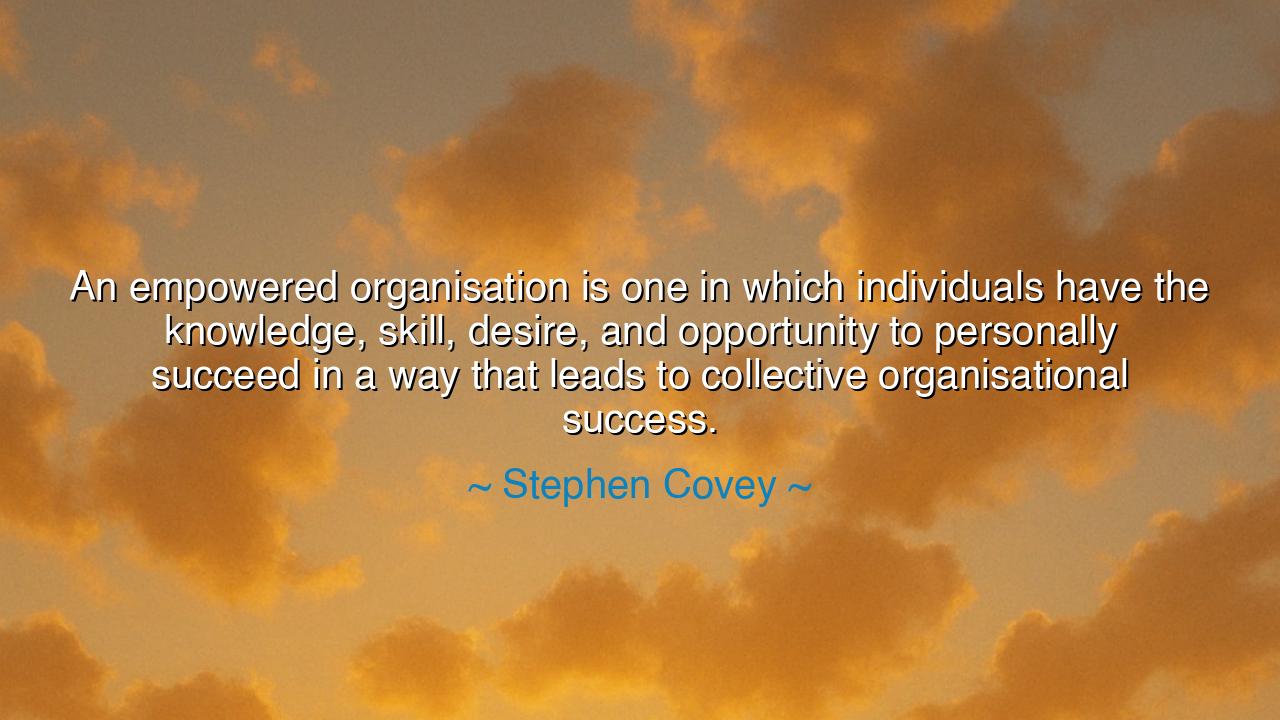
An empowered organisation is one in which individuals have the
An empowered organisation is one in which individuals have the knowledge, skill, desire, and opportunity to personally succeed in a way that leads to collective organisational success.






“An empowered organisation is one in which individuals have the knowledge, skill, desire, and opportunity to personally succeed in a way that leads to collective organisational success.” — Stephen Covey
In these profound and luminous words, Stephen Covey, the great teacher of leadership and purpose, unveils the secret harmony between the individual and the whole. He speaks of the empowered organisation, not as a machine of labor, but as a living body of souls — where each person, through their knowledge, skill, and desire, contributes not merely to their own advancement but to the flourishing of all. His vision transcends the cold logic of management; it calls upon a deeper law of human cooperation, the truth that personal success and collective success are not enemies, but reflections of one another.
The origin of this wisdom lies in Covey’s lifelong study of character, ethics, and leadership. In his book Principle-Centered Leadership, from which this teaching flows, he sought to awaken a generation to the realization that empowerment cannot be imposed — it must be cultivated. An organisation, whether it be a kingdom, a family, or a company, cannot thrive through control or fear. True greatness arises when each individual feels entrusted with purpose, when the fire of knowledge and the freedom of opportunity unite within them. Covey, like a sage of old, reminds us that people are not cogs in a system, but creators within a vision — and that when each person’s heart is lit, the entire structure shines.
To understand his meaning, one must look not only to words, but to the patterns of history. Consider the story of the Wright brothers, Orville and Wilbur, who, through shared purpose and trust, achieved what many believed impossible — human flight. They were not part of a vast institution, nor driven by authority or wealth. Instead, they built an empowered partnership, rooted in mutual learning, experimentation, and unyielding desire. Each brother’s personal mastery contributed to their joint triumph. Their success was not divided; it was multiplied. Covey’s wisdom lives in their example — that when individuals are free to grow, when their knowledge and will are aligned with a noble purpose, the impossible bends and yields before them.
Yet, Covey’s message also carries a warning. For an organisation that stifles its people, that demands loyalty without giving trust, or obedience without purpose, builds its own destruction. History’s fallen empires and failed enterprises share this sin — they forgot that the strength of any system lies in the hearts of its people. Knowledge hoarded by the few breeds stagnation; opportunity denied kills creativity. But when power is shared — when each person becomes a steward, not a subject — the collective grows stronger than the sum of its parts. The wise leader, therefore, is not a tyrant, but a gardener — cultivating the skills and desires of others, trusting that their growth will nourish the whole.
Covey’s insight transforms leadership into a sacred trust. He teaches that empowerment is not the granting of authority, but the awakening of capacity. A true leader does not say, “Follow me,” but rather, “Find your strength, and walk beside me.” Such leadership breeds dignity; it transforms work into contribution and duty into devotion. When an organisation operates under this spirit, every victory is shared, and every failure becomes a lesson, not a condemnation. It is a fellowship of purpose, where success is not seized but grown together — patiently, intentionally, like the steady rise of the sun.
Think also of Mahatma Gandhi, who led not by commanding, but by awakening the knowledge and desire for freedom in millions. His movement succeeded not because he held power over others, but because he empowered others to find the strength within themselves. He did not create followers; he created leaders. In his hands, the nation became an empowered organisation, each individual carrying the light of self-belief and service. Thus, Gandhi’s story becomes the living embodiment of Covey’s teaching: when individuals are awakened, the collective destiny changes.
Therefore, dear listener, let this truth guide you: greatness is never built by domination, but by empowerment. Whether you lead a company, a household, or your own soul, strive to nurture knowledge, to strengthen skill, to ignite desire, and to open opportunity for all. When others rise because of your presence, when their success becomes intertwined with yours, you have touched the essence of leadership.
And remember this: the path to collective success begins not with command, but with character. Share wisdom freely. Create spaces where others can grow. Celebrate both individual and communal victories, for they are one and the same. As Covey teaches, when people are trusted and empowered, they do not merely work — they create, they serve, they lift the world. Thus, the true empowered organisation becomes not a place of labor, but a living testament to the divine power of human potential — where personal fulfillment and collective triumph move together, like two wings carrying humanity toward its highest flight.






AAdministratorAdministrator
Welcome, honored guests. Please leave a comment, we will respond soon